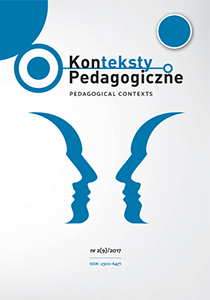Abstract
A teacher is to be responsible for the course of communicative situations in a classroom. First of all, s/he is to be responsible for the communication with learners, which requires among others a recognition of the equal status of subjects in the process of communication, as well as unhindered expression of thoughts, opinions, attitudes and feelings. The present text, based mainly on teachers’ narrative perspectives, is an attempt to demonstrate that teachers treat learners like objects. It describes teachers who implement and follow the imposed topdown requirements related to teaching contents in order to achieve high teaching results, as well as those who want to maintain the unbalanced communication with their learners by implementing and sustaining higher status in this relation. These teachers could be also characterised by a constant lack of establishing the mutual consensus and agreement with students while instilling their role of a main sender of a message what seems to impair the mutual communication, putting a young person in the position of a receiver and continual listener.
References
Babbie, E. (2008). Podstawy badań społecznych, przeł. W. Betkiewicz. Warszawa: Wydawnictwo Naukowe PWN.
Bałachowicz, J. (2009). Style działań edukacyjnych nauczycieli klas początkowych. Między uprzedmiotowieniem a podmiotowością. Warszawa: Wydawnictwo „Comandor”.
Bauman, Z. (2006). Płynna nowoczesność. Kraków: Wydawnictwo Literackie.
Charmaz, K. (2009). Teoria ugruntowana. Praktyczny przewodnik po analizie jakościo-wej, przeł. B. Komorowska.Warszawa: Wydawnictwo Naukowe PWN.
Flick, U. (2012). Projektowanie badania jakościowego, przeł. P. Tomanek. Warszawa: Wydawnictwo Naukowe PWN.
Gibbs, G. (2011). Analiza danych jakościowych, przeł. S. Zabielski. Warszawa: Wydawnictwo Naukowe PWN.
Giroux, H.A. (1993). Teoria krytyczna i racjonalność w edukacji obywatelskiej.W: Z.L. Witkowski(red.), Spory o edukację: dylematy i kontrowersje we współczesnej pedagogice (s. 149–184). Warszawa: Instytut Badań Edukacyjnych.
Habermas, J. (1983). Teoria i praktyka. Wybór pism, przeł. M. Łukasiewicz, Z. Krasnodębski.Warszawa: Państwowy Instytut Wydawniczy.
Hammerslay, M. i Atkinson, P. (2000). Metody badań terenowych, przeł. S. Dymczyk. Poznań: Wydawnictwo Zysk i Ska.
Klus-Stańska, D. (2000). Konstruowanie wiedzy w szkole. Olsztyn: Wydawnictwo UWM.
Kwiatkowska, H. (1997). Edukacja nauczycieli. Konteksty – kategorie – praktyki. Warszawa: Instytut Badań Edukacyjnych.
Kwiatkowska, H. (2008). Pedeutologia. Warszawa: Wydawnictwa Akademickie i Profesjonalne.
Kvale, S. (2010). Prowadzenie wywiadów, przeł. A. Dziuban. Warszawa: Wydawnictwo Naukowe PWN.
Miles, M. i Huberman, A.M. (2000). Analiza danych jakościowych, przeł. S. Zabielski.Białystok: Wydawnictwo „Transhumana”.
Potulicka, E. i Rutkowiak, J. (2010). Neoliberalne uwikłania edukacji. Kraków: Oficyna Wydawnicza „Impuls”.
Retter, H. (2005). Komunikacja codzienna w pedagogice, przeł. M. WojdakPiątkowska. Gdańsk: Gdańskie Wydawnictwo Psychologiczne.
Schulz von Thun, F. (2002). Sztuka rozmawiania. Analiza zaburzeń, przeł. P. Włodyga. Kraków: Wydawnictwo WAM.
StemplewskaŻakowicz, K. (2005). Metoda wywiadu w psychologii. W: K. StemplewskaŻakowicz i K. Krejtz (red.), Wywiad psychologiczny. Wywiad jako postępowanie ba dawcze (s. 31–89). T. 1. Warszawa: Pracownia Testów Psychologicznych PTP.
In accordance with the recommendation of the Ministry of Science and Higher Education, which aims to counteract the practice of “ghostwriting” and “guest authorship,” all authors submitting their text for publication should attach an author’s statement which declares the contribution of each of the authors to the article. The printed and signed statement should be delivered by mail or other means to editor-in-chief Joanna Skibska or sent in the form of a scan to the following e-mail address: redakcja@kontekstypedagogczne.pl. The authors will not receive remuneration for publishing their papers. The editors reserve the right to make minor editorial changes to the articles which will not affect the substance of the article. We encourage all authors to prepare their articles in accordance with the guidelines for manuscript preparation. Download pdf file.
Authors transfer all copyrights and grant the journal the right of first publication with the work simultaneously licensed under a Creative Commons Attribution License that allows others to share the work with acknowledgement of the work's authorship and initial publication in this journal. All authors agree to the publishing of their email addresses, affiliations and short bio statements with their articles during the submission process.

